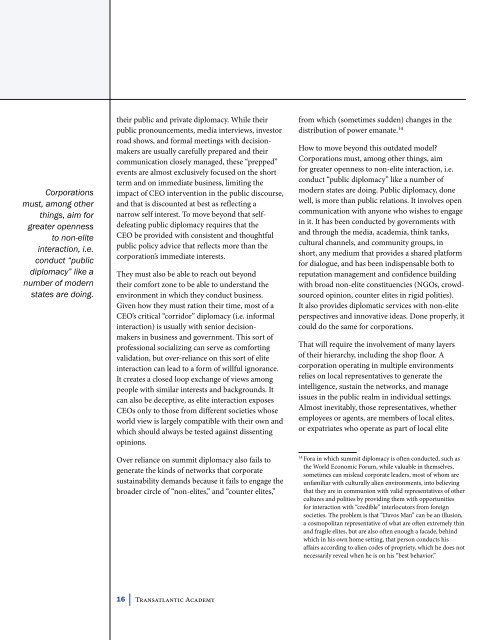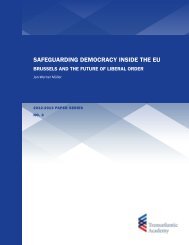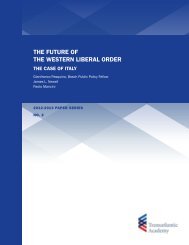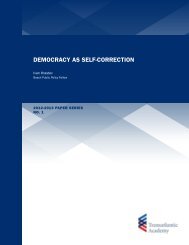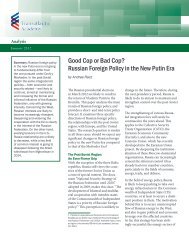CORPORATE STATECRAFT - Transatlantic Academy
CORPORATE STATECRAFT - Transatlantic Academy
CORPORATE STATECRAFT - Transatlantic Academy
You also want an ePaper? Increase the reach of your titles
YUMPU automatically turns print PDFs into web optimized ePapers that Google loves.
Corporationsmust, among otherthings, aim forgreater opennessto non-eliteinteraction, i.e.conduct “publicdiplomacy” like anumber of modernstates are doing.their public and private diplomacy. While theirpublic pronouncements, media interviews, investorroad shows, and formal meetings with decisionmakersare usually carefully prepared and theircommunication closely managed, these “prepped”events are almost exclusively focused on the shortterm and on immediate business, limiting theimpact of CEO intervention in the public discourse,and that is discounted at best as reflecting anarrow self interest. To move beyond that selfdefeatingpublic diplomacy requires that theCEO be provided with consistent and thoughtfulpublic policy advice that reflects more than thecorporation’s immediate interests.They must also be able to reach out beyondtheir comfort zone to be able to understand theenvironment in which they conduct business.Given how they must ration their time, most of aCEO’s critical “corridor” diplomacy (i.e. informalinteraction) is usually with senior decisionmakersin business and government. This sort ofprofessional socializing can serve as comfortingvalidation, but over-reliance on this sort of eliteinteraction can lead to a form of willful ignorance.It creates a closed loop exchange of views amongpeople with similar interests and backgrounds. Itcan also be deceptive, as elite interaction exposesCEOs only to those from different societies whoseworld view is largely compatible with their own andwhich should always be tested against dissentingopinions.Over reliance on summit diplomacy also fails togenerate the kinds of networks that corporatesustainability demands because it fails to engage thebroader circle of “non-elites,” and “counter elites,”from which (sometimes sudden) changes in thedistribution of power emanate. 14How to move beyond this outdated model?Corporations must, among other things, aimfor greater openness to non-elite interaction, i.e.conduct “public diplomacy” like a number ofmodern states are doing. Public diplomacy, donewell, is more than public relations. It involves opencommunication with anyone who wishes to engagein it. It has been conducted by governments withand through the media, academia, think tanks,cultural channels, and community groups, inshort, any medium that provides a shared platformfor dialogue, and has been indispensable both toreputation management and confidence buildingwith broad non-elite constituencies (NGOs, crowdsourcedopinion, counter elites in rigid polities).It also provides diplomatic services with non-eliteperspectives and innovative ideas. Done properly, itcould do the same for corporations.That will require the involvement of many layersof their hierarchy, including the shop floor. Acorporation operating in multiple environmentsrelies on local representatives to generate theintelligence, sustain the networks, and manageissues in the public realm in individual settings.Almost inevitably, those representatives, whetheremployees or agents, are members of local elites,or expatriates who operate as part of local elite14Fora in which summit diplomacy is often conducted, such asthe World Economic Forum, while valuable in themselves,sometimes can mislead corporate leaders, most of whom areunfamiliar with culturally alien environments, into believingthat they are in communion with valid representatives of othercultures and polities by providing them with opportunitiesfor interaction with “credible” interlocutors from foreignsocieties. The problem is that “Davos Man” can be an illusion,a cosmopolitan representative of what are often extremely thinand fragile elites, but are also often enough a facade, behindwhich in his own home setting, that person conducts hisaffairs according to alien codes of propriety, which he does notnecessarily reveal when he is on his “best behavior.”16<strong>Transatlantic</strong> <strong>Academy</strong>


